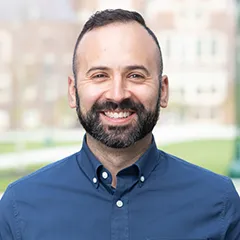
Professional Background
Jaime Castillo is an adjunct professor in the School of Counselor Education as well as the Director of Counseling Services at the State University of New York at Geneseo. He enjoys working alongside young adults as they navigate the challenges, opportunities, and adjustments of the college environment. Dr. Castillo has experience in all sizes of schools from his own education. He earned his PhD in counseling and counselor education from Syracuse University in 2016, an MS in school counseling from the University of Scranton in 2008, and a BS in psychology from Penn State University. He has taught many counseling courses, including 550 Group Counseling, CE 638 Multicultural Counseling, CE 560 Psychology Testing and Assessment, CE 540 Diagnosis of Psychopathology, and CE 637 Management Clinical Mental Health Counseling.
Dr. Castillo has made significant contributions to the field of counseling through various publications. In 2020, Dr. Castillo authored chapters in two notable books: "Beginning Your Counseling Career: Graduate Preparation and Beyond" and "The Handbook of Counseling and Counselor Education.” Additionally, Dr. Castillo contributed to "Experiential Activities for Teaching Social Justice and Advocacy Competence in Counseling," with chapters on peer-to-peer ecological systems diagrams and fostering dialogue in white racial identity development through live discussion boards. His research on cognitive complexity in counseling and counselor education was published in the "Journal of Counselor Preparation and Supervision" in 2018. Collaborating with K. Hurt, Dr. Castillo also co-authored a paper on accreditation, professional identity, and professional competence, published in the "Journal of Counselor Leadership & Advocacy" in 2017.
Positioning himself as a constructivist, Dr. Castillo believes our personal narratives and experiences inform our pedagogies. He seeks to establish a learner-centered, constructivist environment that is inclusive of all styles and abilities. As Parker Palmer stated, “We teach who we are.” As such, Dr. Castillo believes our students learn as they are. He strives to provide students with a learning environment that communicates acceptance of diverse ideas and experiences. He does not assume that all students come to knowledge in the same way; therefore, he honors and supports various learning styles and strives towards creating an environment that is universally inclusive.
Dr. Castillo has found Kolb’s Model of Experiential Learning (1984) to be his theoretical framework for teaching. Experiential learning theory identifies experiences as the keystone to the learning process, and that learning is relearning (Kolb, 1984). Much like in constructivist approaches, Kolb stated that the purpose of education within experiential learning theory is to cultivate skills in a student’s process of acquiring knowledge rather than requiring knowledge memorization.
Dr. Castillo believes that students learn when they are continuously presented with problems, questions, and/or circumstances that challenge them to think in different ways. Expanding their thinking creates new pathways that allow students to construct a new model of what they know. Engaging in an environment where they can interact with the material with different senses, summarize their learning, and ground it in their personal experiences allows students to synthesize knowledge at different levels of complexity.
Academic Degrees
- Syracuse University, PhD in Counseling and Counselor Education, 2016
- University of Scranton, MS School Counseling, 2008
- Penn State University, BS Psychology, 2006
